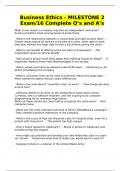2023-2024
Dit samenvattend werk is gebaseerd op het handboek Managing and Organizations, geschreven door Clegg. Naast de
concepten uit het boek worden ook topics behandeld die gezien worden in het opleidingsonderdeel Introduction to
Managing and Organizations, gedoceerd aan de faculteit FBE van de Universiteit Antwerpen.
,CHAPTER 1 - MANAGING PEOPLE IN ORGANIZATIONS
https://study.sagepub.com/managingandorganizations6e
1. Sense-making
Sensemaking is
● an important part of the managerial skill set (but not rational managerial)
● the process through which individuals and groups give meaning to something, especially to explain
new and unexpected events
→ different perspectives: one situation can be translated in different ways
● the process of revising past rationalizations in the light of new information (continuous event)
In other words, we try to put to words what we see and how we understand it.
→ categorize information (in blocks) and find words for it so you can describe the events
Sense-making is individual, but is not made in isolation. Different cues can have an impact on your sense
● experiences
● what others say they think is happening
● patterns and events that you recognize
Framing is the process of filtering relevant information out of the infinite number of stimuli that we constantly get.
A key part of the manager’s role is to ‘frame’ the sense that others have of the roles that they play in the organization.
2. Managerialism
Managerialsm = a claim to special expertise premised on managerial rationality characterizing organizations
→ the belief in management as a means capable of solving any problem (by using managerial techniques)
Managerialism is a form of economic rationalism, because it is economic driven, focussing on managing money.
→ rationalist management theories
3. Managerial rationality
Management goes beyond managerialism. Aside from managing financial capital, managerial rationality also focuses
on symbolic capital (reputation), social capital (relations), human capital (experiences) …
→ sensemaking plays an important role in these kinds of capital
Managerial rationality is
● the conclusion that managerialism is not enough
● the realization that a manager can not be a pure rationalist individual (bounded rationality)
→ you can never have perfect knowledge over the situation (satisfactory instead of optimal)
, CHAPTER 2 - DIGITALIZATION AND GLOBALIZATION
1. Digital organizations
The digital age
● digital technologies and a growing international division of labor between economies → global
● contemporary competition is based on competitive advantages that arise from innovation and
enterprise, instead of being close to raw materials
Challenges in the digital age
● pressure to deglobalization from trade wars, pandemics and political responses to them
● global panics can lead to disruptions of supply chains
Challenges for managing technological changes
● responsive organizations should have employees who are capable of problem-solving
● different generations and digital capabilities require different types of management
● the possibility of workers to work all over the world requires more flexibility
Managers must see the challenges and educate their team
● changing experiences of time and space for employees
● increasing importance of equality, inclusion and diversity
→ shift in organizational cultures and social relations
○ equity = organization policies ensure that everyone in the organization has access to the
same opportunities, irrespective of the diversity of their identities
○ inclusion = a sense of belonging; being incorporated as a person with a voice
Digitalization in an organization
● increase in knowledge-intensive work → mental rather than manual labor
● employees need to be capable of working with sophisticated databases and software as well as
knowledge-management systems
Digital bubbles arise because electronic media support leads to like-minded networks.
● legitimacy is increasingly inscribed in a shared sense of emotionality rather than rationality
● bubbles can also be exploited commercially → brand loyalty (e.g. Apple)
Digital nomads are mobile workers equipped with a laptop and WiFi, connecting anywhere and choosing mobility
over a fixed residence
2. Organizational culture and social relations at work
Advantages of globalization: diversity is increasingly seen as an asset for an organization
● people with different experiences and background can contribute more varied insights
● to sell globally, you have to understand the local markets in which you seek to trade


